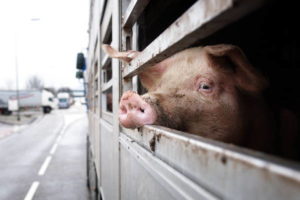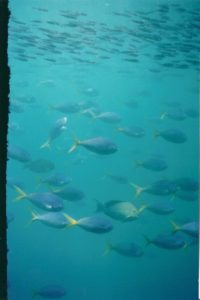Worldlog du 17 avril 2017
‘Tant qu’il y a des abattoirs, il y aura des champs de bataille.’ Une citation historique de Tolstoj, l’écrivain russe, philosophe et penseur politique. En même temps une citation encore très actuelle. Fin mars des images très conflictuelles prises sous couvertures par l’organisation du bien-être des animaux Animal Rights ont été publiées, montrant comment un abattoir à Tielt en Belgique a enfreint structurellement à peu près toutes les règles pour le bien-être des animaux et la sécurité d’alimentation.
Choquant, mais pas étonnant. Sachant que chaque heure 650 porcs sont abattus aux Pays-Bas et que les contrôleurs n’ont même pas cinq secondes pour examiner un porc, les soucis du traitement des animaux dans les abattoirs néerlandais sont également très grands. C’est la raison pour laquelle nous avons plaidé dans l’Assemblée nationale néerlandaise pour une vidéosurveillance obligatoire dans les abattoirs. Et avec succès ! Notre proposition a été adoptée par une grande majorité. Un pas important vers plus de transparence de sorte que le secteur prenne plus au sérieux le bien-être des animaux et que le consommateur regarde d’un air plus conscient la viande dans son assiette. Car pour citer les paroles de Paul McCartney :’Si les abattoirs avaient des murs en verre, tout le monde serait végétarien’.

Il y avait aussi des nouvelles choquantes de notre monde sous-marin. Le corail dans les Caraïbes risque de disparaître au cours des quinze prochaines années et aussi de grandes parties de la Grande Barrière de Corail de l’Australie sont touchées par la décoloration due au réchauffement de l’eau de mer. Pour sauver le corail, nous devons rapidement, tous ensemble, émettre beaucoup moins de CO2. Heureusement en Europe beaucoup de pays ont déjà réussi à diminuer leur émission, avec cas extrême positif la Grande-Bretagne qui a obtenu une baisse de 30 pour cent, en partie en raison de l’introduction de prix du CO2. Un outil efficace pour lequel le Parti pour les Animaux plaide également.
Pourtant la baisse en Europe doit doubler sa vitesse pour atteindre les objectifs de Paris. Et les Pays-Bas – où l’émission de CO2 a même augmenté au plus haut niveau jamais ! – doivent encore faire des pas beaucoup plus grands.

Des pas qui peuvent seulement être faits quand les gouvernements abandonnent le mantra destructeur de croissance, croissance, croissance. Et le passage à un système économique fondé sur la capacité de charge de la terre et de la société. Un système dans lequel nous sommes plus que des employés, des consommateurs et des propriétaires de capital. Kate Raworth de l’Institut de changement environnemental de l’Université d’Oxford a conçu un nouveau modèle économique : The Doughnut. Lisez ici l’article intéressant de ce sujet.
Il y a eu de beaux résultats pendant les élections communales en Finlande. Beaucoup de voix ont été traînées. Malheureusement juste pas assez de voix pour obtenir un siège du conseil dans l’une des six municipalités participantes. Mais comme notre parti sœur finlandaise a indiqué ‘Avec une petite équipe et un petit budget nous sommes très contents du résultat.’
A bientôt. Cordialement,
Marianne
‘As long as there are slaughterhouses there will always be battlefields.’ A historic quote by Tolstoj, the Russian writer, philosopher and political thinker. At the same time, it is still a topical quote. At the end of March, some highly confronting undercover images taken by the animal welfare organisation Animal Rights were published, which showed that almost all rules and regulations for animal welfare and food safety were structurally violated in a slaughterhouse in Tielt in Belgium.
Shocking, but not surprising. Knowing that 650 pigs are slaughtered every hour in the Netherlands and that inspectors get not even five seconds to check a pig causes also great concern about the treatment of animals in Dutch slaughterhouses. That is why we made a plea in the Lower House for mandatory CCTV in slaughterhouses. And we did so successfully. Our motion was adopted by a great majority. An important step towards more transparency, thus forcing the industry to take animal welfare more seriously and the consumer to be more conscious of the meat on his or her plate. And to quote Sir Paul McCartney: ‘If slaughterhouses had glass walls, everyone would be a vegetarian’.

There were shocking messages concerning our underwater world. The corals in the Caribbean are threatened to vanish within fifteen years and large parts of the Australian Great Barrier Reef are affected by severe bleaching due to the warming of seawater. To save the corals, we should all immediately reduce the emission of greenhouse gases into the atmosphere. Fortunately, many countries in Europe reduced their emissions considerably already. With Great Britain as a positive peak, which reached a reduction of 30 per cent, partly due to the introduction of its CO2 prices. An efficient instrument which is advocated by the Party for the Animals too.
Yet, greenhouses gases in Europe must be reduced twice as fast to meet the Paris climate goals. And the Netherlands – where the emission of greenhouse gases increased to the highest level ever! – still has to make great efforts.

Efforts that can only be achieved if the governments set aside their destructive mantra of growth, growth, growth. And change to an economic system that is based on the capacity of the earth and society. A system where we are more than just employees, consumers and owners of capital. Kate Raworth of Oxford University’s Environmental Change Institute thought up such new economic model: The Doughnut. Read here the interesting article about it.
Great results at the municipal elections in Finland. Many votes obtained. But unfortunately just not enough to obtain a municipal council seat in one of the six participating municipalities. But as our Finnish sister party pointed out ‘A great result with a small team and a small budget.’
Until soon. Kind regards,
Marianne